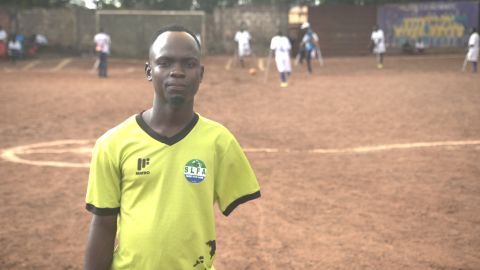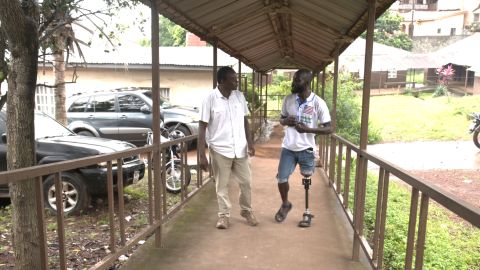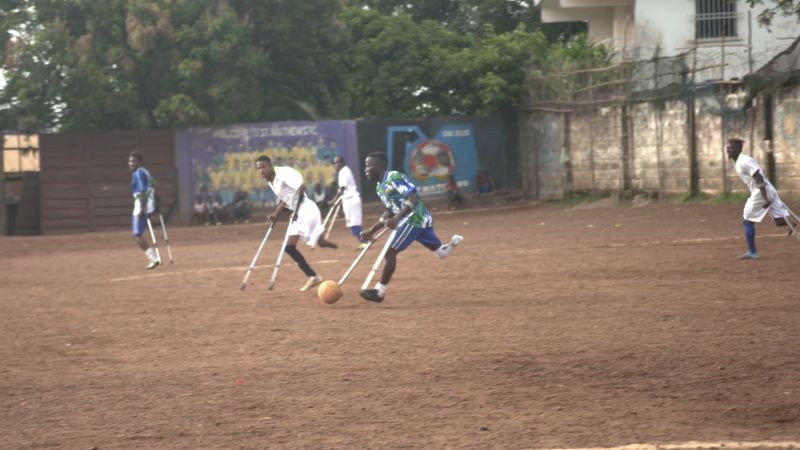‘Ambassadors of peace’: Amputee football association brings together Sierra Leone’s civil war survivors | CNN
CNN
—
On a busy weekend in Freetown, Sierra Leone, dozens of people gather to watch an afternoon football match not unlike countless others you’d find anywhere else in the world. But there’s one striking difference – these players are all amputees.
They’re members of the Single Leg Amputee Sports Association (SLASA), an organization co-founded by pastor Mambud Samai in 2001 after he returned home toward the end of Sierra Leone’s deadly civil war, which lasted from 1991 to 2002 and killed at least 50,000 people across the country. Thousands more were left with missing limbs during a brutal campaign to terrify the civilian population.
After coming across a refugee camp filled with hundreds of amputees, Samai felt compelled to help. “At that time, there were no activities like trauma recovery for them. So, amputees believed that once they lost their limbs and their legs, they have no future, they have no opportunity. So, I volunteered myself to give them confidence,” he said.
While at the refugee camp, he met an American missionary who introduced him to a form of adaptive football. After showing the amputees how to play, the response was overwhelming and SLASA was formed, “to give hope to the amputees, to give confidence to the amputees, and to allow them to become ambassadors of peace,” Samai said.
According to the World Amputee Football Federation, players cannot use prosthetics and instead power across the field on crutches. Each team has seven players on the field at a time, with outfield players only having one leg and goalkeepers only having one arm.
Several SLASA players have since gone on to compete in international programs including the World Amputee Football Championships, Amputee Africa Cup of Nations, and the Open European Amputee Football Championship.
Related: Football saved his life. Now this former Ghana star is scouting the next generation of underprivileged talent
“Most of them are now very proud that they can represent their country at international competitions,” Samai said. “They are contributing something back to society.”
Samai says the sport is not only a good form of exercise, but it unites players and serves as a “therapy” for war victims to face their shared trauma. “We try to give them hope and then give them the credibility that they are useful, they are important to society,” he said.

Ali Badara Kamara is a goalkeeper in the SLASA league. He says he’s grateful for the life-changing opportunities he’s received. “My mother was afraid (for) me to play football because she sees me as an amputee. She thought that if I fell on the floor, I would have another problem,” he says. “But SLASA (has) taken me to Ghana, Kenya, Tanzania.”
Kamara is one of the more than 80 million people with disabilities living across the continent. According to the United Nations, that figure includes those with mental health conditions, birth defects and other physical impairments. With assistive devices often unavailable or unaffordable, many find employment hard to come by and are left begging on the streets.
While football matches only last 90 minutes, Samai’s latest mission is to find a way to help amputees beyond the pitch.
“My passion (is) to make sure that every life, irrespective of your disability or irrespective of your background, that you are able to be happy and you are able to smile at the end of the day,” Samai said.

To achieve that, SLASA works closely with the National Rehabilitation Center in Sierra Leone and partners with international organizations like SwissLimbs to provide prosthetics for amputees and train local technicians.
In 2018, Samai traveled to Japan to study sustainable agriculture leadership and community development. Upon his return, he began offering classes on sustainable agriculture through SLASA.
Related: From child soldier to boxing champion – Mohamed Kayongo on why he’s using boxing to teach life lessons
SLASA also assesses members’ education and provides learning resources to those in need. Its goal is to get more amputees off the streets and provide them with a safe way to make a living for themselves and their families.
To date, Samai says SLASA has directly assisted 350 amputees, and hopes to grow that number. The ultimate goal is to build a regulation pitch and rehabilitation center of its own.
“We want Sierra Leone to compete with another countries in terms of development,” Samai said. “We believe that disabled people should not be left behind.”
Watch the full episode of African Voices featuring Mambud Samai here.




